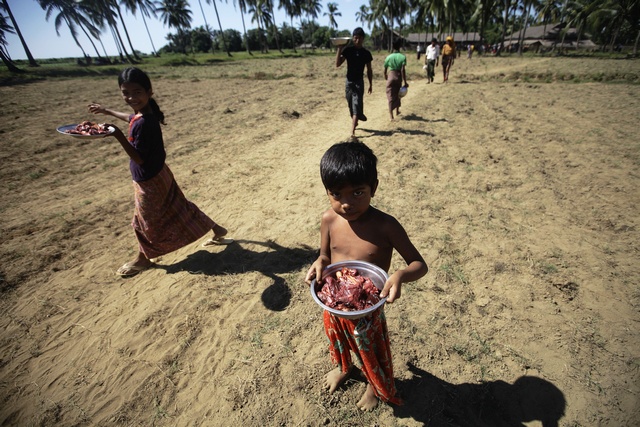The return to Arakan State of international aid agencies such as Médecins Sans Frontières (MSF) is essential for health services in the region at a time when there is a “massive need” for development in both the Buddhist and Muslim communities, British Ambassador to Burma Andrew Patrick told DVB on Thursday.
“The responsibility for health and education in Rakhine [Arakan] State is the government’s responsibility, and the way to facilitate aid is through INGOs. The plan to allow MSF back should improve health services,” he added.
The British ambassador was speaking after returning from a two-day visit earlier this week to state capital Sittwe alongside his US counterpart, Ambassador Derek Mitchell.
A delegation led by the US and UK ambassadors to Burma met on Sunday and Monday with local MPs and community leaders in Sittwe, and were accompanied by Immigration Minister Khin Yi and President’s Office Minister Soe Thein.
Patrick noted that he had paid a visit to the Muslim neighbourhood of Aung Mingalar in Sittwe, which is barricaded into segregation from the rest of the volatile city where tensions between Muslims and Buddhists have resulted in bloodshed on several occasions over the past two years.
The British ambassador described the mood in the Muslim enclave as “depressing”, noting that the residents have “no opportunity to move, to leave or to work” outside the restricted area.
He said the impact of the isolation had been “quite severe”.
[related]
Thar Pwint, a community leader who sat at a meeting in the Sittwe Hotel on Sunday, said the ambassadors urged Arakanese leaders to focus on human rights, equality and harmony between the different communities, regardless of racial identity.
“They were here to talk about human rights,” said Thar Pwint. “We, too, support human rights, but they came here saying things like ‘Everyone is a human being, and all human beings are equal’. We told them that this will only be realistic when the whole world is under one government.”
He said the US ambassador urged the Arakanese community to recognise the Rohingya as an ethnicity in Burma, as they face expulsion from the country if they agree to list themselves as ‘Bengali’ in a newly implemented citizenship verification programme.
Thar Pwint said that the community leaders in turn explained the country’s citizenship law to him, and told him that people of any race can become citizens of Burma if they meet the criteria.
While not addressing Ambassador Mitchell’s comments about the status of the Rohingya, the US embassy in Rangoon said, “The delegation consulted with local communities to discuss their concerns and vision for the urgent and long-term priorities of Rakhine State. One clear message from these communities is that more outreach, communication, and transparency from both the government and the international community concerning any plans or activities in Rakhine State is needed to prevent misunderstandings and build confidence for the future.”
On the question of Rohingya citizenship, British Ambassador Patrick said the UK “supports every group’s right to self-identify”.
He acknowledged that it was a divisive issue in the region, and one which the Arakanese Buddhist population sees as a “direct challenge”.
On Monday, the delegation met with leaders of the Rakhine National Party (RNP) at the party’s headquarters in Sittwe. Central committee member Khin Maung Gree said they discussed the resumption of operations by MSF in the region.
“We stressed that MSF must change their ways and ensure transparency, while at the same time respecting our culture and the traits of the Arakanese,” said Khin Maung Gree, adding that the US ambassador promised to monitor MSF operations.
The MSF – after more than 20 years of providing humanitarian aid, healthcare and medical services in Arakan State – was forced to suspend operations in the region after being targeted with hostility by Arakanese Buddhist locals who accused the organisation of bias towards the Muslim minority, and attacked its office last year.
Last week, the Ministry of Health and the Arakan State government released a joint-statement inviting MSF to resume operations.
While the move was welcome by international observers, Sittwe-based nationalist group Arakan Social Network released a statement on Sunday insisting that the people of Arakan do not wish for MSF to return.
On 25 July, MSF said in a statement that they “welcomed” the call from the Arakan State government to resume its operations but remained “cautious”.
This article was edited on 1 August 2014 to correct the following: MSF has operated in Arakan State since 1994 — for the past 20 years — not, as previously reported, for the past ten years.



